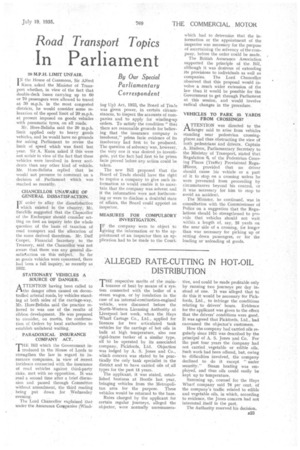Road Transport Topics
Page 33

If you've noticed an error in this article please click here to report it so we can fix it.
In Parliament
By Our Special Parliamentary Correspondent
20 M.P.H. LIMIT UNFAIR.
IN the House of Commons, Sir Alfred 1 Knox asked the Minister of Transport whether, in view of the fact that double-deck buses carrying up to 60 or 70 passengers were allowed to travel at 30 m.p.h. in the most congested districts, he would consider some relaxation of the speed limit of 20 m.p.h. at present imposed on goods vehicles with pneumatic tyres, on all roads.
Mr. Hore-Belisha said the 20 m.p.h. limit applied only to heavy goods vehicles, and he would have no grounds for asking Parliament to revise the limit of speed which was fixed last year. Sir A. Knox asked if this were not unfair in view of the fact that these vehicles were involved in fewer accidents than any other kind of vehicle. Mr. H ore-Belisha replied that he would not presume to comment on a decision of Parliament which was reached so recently.
CHANCELLOR UNAWARE OF GENERAL DISSATISFACTION.
I N order to allay the dissatisfaction which existed in the cbuntry, Mr. Sutcliffe suggested that the Chancellor of the Exchequer should consider setting on foot an inquiry into the whole question of the basis of taxation of road transport and the allocation of the sums derived therefrom. Mr. Duff Cooper, Financial Secretary to the Treasury, said the Chancellor was not aware that there was any general dissatiAiction on this subject. So far as goods vehicles were concerned, there had been a" full inquiry, so recently as , 19:32.
STATIONARY VEHICLES A SOURCE OF DANGER.
A TTENTION having been called to the danger often caused on decontrolled arterial roads, by vehicles standing at both sides of the Carriage-way, Mr. Hore-Belisha said the practice referred to was one of the results of ribbon development. He was prepared to consider, on merits, the confirmation of Orders by local authorities to establish unilateral waiting.
PARADOXICAL INSURANCE COMPANY ACT.
THE Bill which the Government introduced in the House of Lords to strengthen the law in regard to insurance companies, in view of recent incidents connected with the insurance of road vehicles against third-party risks, met with no opposition. It was read a second time after a brief discussion and passed through Committee without amendment, the third reading being put down for Wednesday evening.
The Lord Chancellor explained that under the Assurance Conspanies (Wind
ing Up) Act, 1933, the Board of Trade was given power, in certain circumstances, to inspect the accounts of companies and to apply for winding-up orders. To satisfy the condition." that there are reasonable grounds for believing that the insurance company is insolvent," prima facie evidence of its insolvency had first to be produced. The question of solvency was, however, the very one it was desired to investigate, yet the fact had first to be prima facie proved before any action could be taken.
The new Bill proposed that the Board of Trade should have the right to require a company to give such information as would enable it to ascertain that the company was solvent and it the information were not forthcoming or were to disclose a doubtful state of affairs, the Board could appoint an inspector.
MEASURES FOR COMPULSORY INVESTIGATION.
I F the company were to object to giving the information or to the appointment of an inspector then an application had to be made to the Court. which had to determine that the information or the appointment of the inspector was necessary for the purpose of ascertaining the solvency of the company, before the order could be made.
The British Assurance Association supported the principle of the Bill, although it was desirous of extending its provisions to individuals as well as companies. The Lord Chancellor observed that this proposal would involve a much wider extension of the law than it would be possible for the Government to get through Parliament at this session, and would involve radical changes in the procedure.
VEHICLES TO PARK 25 YARDS
• FROM CROSSINGS?
ATTENTION was directed to the danger said to arise from vehicles standing near pedestrian crossingplaces and thus obstructing the view of both pedestrians and drivers. Captain A, Hudson, Parliamentary Secretary to the Ministry of Transport, stated that Regulation 6, of the Pedestrian. Crossing Places (Traffic) Provisional Regulattions, provided that no driver should cause his vehicle or a part of it to stop on a crossing unless he were prevented from proceeding by circumstances beyond his control, or it was necessary tor him to stop to avoid an accident.
The Minister, he continued, was in consultation with the Commissioner of Police on a suggestion that the Regulations should be strengthened to provide that vehicles should not wait within a length of, say, 25 yards on the near side of a crossing, for longer than was necessary for picking up or setting down passengers, or for the loading or unloading of goods.




















































































